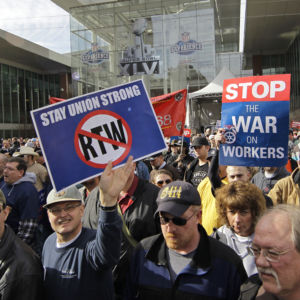Missouri right-to-work supporters are optimistic that this is the year they will finally be able to pass the policy despite numerous past failures.
Missouri has come close to passing right-to-work numerous times since 1978. The policy outlaws mandatory union dues or fees as a condition of employment. Those opposed to the policy have defeated it each time, but now a new governor and support in the legislature have opened a clear path to passage.
“This is not a new battle for Missouri,” Mark Rhoads, a lobbyist with Missouri Rising, told InsideSources. “What makes it new and hopeful is that the legislative leadership as well as the governor are excited about this and have made it one of their top priorities.”
Republican Gov. Eric Greitens expressed his support for the policy before winning the November election. Republicans in the legislature were able to maintain their majority. The Missouri House passed the policy Thursday, and it could see a vote in the state Senate as early as next week.
“It highlights the importance of the issue and the sincere hope that this is the year it will finally get done,” Rhoads said. “We’re looking at having a bill on the governor’s desk within three to four weeks. And again, that would be an exceptionally fast pace in Missouri. Anything that passes before spring break and is on the governor’s desk is a number one priority bill.”
Former Democratic Gov. Jay Nixon vetoed the policy when it was passed back in 2015. Republicans, at the time, held an override vote but failed to meet the supermajority they needed. Democrats and labor unions argue right-to-work undermines the ability of workers to negotiate with their employers.
“Missouri Democrats are proud to stand with labor,” Missouri Democratic Party Chairman Stephen Webber told InsideSources. “We’re disappointed Republicans have prioritized cutting worker wages by pushing a right-to-work for less scheme.”
Those in support of the policy counter that it actually empowers workers while attracting businesses. The National Right to Work Committee (NRTW) and other proponents argue the law doesn’t hurt workers because it merely gives them the freedom to choose whether they want to be in a union.
“A Missouri Right to Work law would free thousands of Missouri workers who have been forced to pay tribute to a union boss just for the privilege of getting and keeping a job so they can provide for their families,” NRTW President Mark Mix said in a statement provided to InsideSources. “The law would also provide a much needed economic boost for Missouri.”
Missouri Rising has played a critical role in helping move the policy through the legislature. Rhoads has testified before lawmakers about right-to-work and helped legislative leadership with policy research. He believes the election results show how much state residents support the policy.
“Obviously there were other issues that are important district by district,” Rhoads said. “Overall, if you look at the preeminent issues resonated during the 2016 campaign cycle, right-to-work was right up there.”
Missouri labor unions have held numerous rallies over the years to stop past attempts to enact the policy. Unions have been at the forefront of opposing the policy in states around the country. Nevertheless, there is a total of 27 states that have passed right-to-work with Kentucky being the latest earlier in the month.
“We are proud to be reaching out to both lawmakers and Missourians directly to emphasize why right-to-work will spur economic growth in the state and create new jobs for workers,” Missouri Rising Communications Director Jeremy Adler told InsideSources. “Missourians should be proud and thankful that their elected leaders have embraced this solution that will provide a jolt for the economy and ensure it stays competitive with surrounding states.”
Americans overwhelming support right-to-work despite its very adamant opponents. Gallup found in a 2014 poll the policy has 71 percent support. The same poll showed unions were generally supported as well but at only 53 percent.
Missouri Rising is a nonprofit research group that promotes conservative policies. It is a state-based chapter of America Rising Squared.

